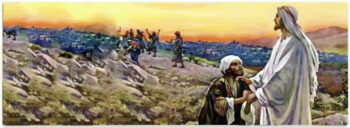Words and God’s Word ‘Thank You’

By Fr Tom Ryan SM
Part 7 of 10
Like ‘please’, saying ‘thank you’ is an essential lubricant in our lives.
Without it, the wheels of living with others will be clunky, will stop and start and, at times, might (unfortunately) grind to a halt.
Such can be the case with someone who considers they are always entitled; when it comes to a word of thanks or a gesture of appreciation, they are tone deaf.
When we say ‘thank you’, it is not just courtesy, showing good manners. These two words of gratitude will often convey how I feel. But beneath that, they signal an attitude of mind and heart, namely, a virtue.
 In other words, I am thankful for all that I have: what I’ve been given; what I may have been able to achieve; and, importantly, for those people who have made that possible.
In other words, I am thankful for all that I have: what I’ve been given; what I may have been able to achieve; and, importantly, for those people who have made that possible.
Those two simple words can even reflect something deeper—a way of seeing life and the world. David Steindl-Rast suggests the word ‘gratefulness’. It is the sort of experience many of us can have walking by the sea shore or on a hill top at sunset or gazing at the stars at night.
It brings a sense of ‘cosmic belonging’ but also an awareness that this is not a belonging that is deserved. We are ‘truly blessed’.
Which reminds us that it’s not just about counting our blessings: it’s about sipping them slowly, savouring each one. Importantly, to share them with others as much as possible.
As G. K. Chesterton once said:
“Nothing taken for granted; everything received with gratitude; everything passed on with grace.”
The words ‘grateful’, then and ‘gracious’ go hand in hand.
Consider the word gratitude. It comes from the Latin word gratia which means ‘favour’, ‘grace’, or ‘gift’. Why is gratitude significant? Because it is sign of self-transcendence, namely, the capacity to step out of ourselves.
To foster it means we need to look for the good in others, and that all life and creation itself is gift. Gratefulness helps us to be a little more like God in our lives.
Which brings us to the next step in our reflection.
God’s Word and Being Thankful.
Giving thanks is a frequent phrase in St Paul’s letters.
His awareness of others is part of his gratitude to God:
“We have never failed to remember you in our prayers and to give thanks for you to God, the Father of our Lord Jesus Christ.” (Col. 1:3).
Jesus himself gives praise and thanks:
“I thank you, Father, Lord of heaven and earth, because you have hidden these things from the wise and intelligent and have revealed them to infants .”(Matt 11: 24, NRSV version)
But what about during Jesus’ ministry? What clues can we find there about gratitude?
There is a striking incident in Luke 17: 11-19, the healing of the ten lepers. They keep their distance (to ensure the Jesus was not physically or religiously contaminated). From ‘far off’, they plead: “Jesus! Master! Take pity on us.”
Jesus responds by telling them to go and show themselves to the priests. While they were on their way, they are healed.
One of them stopped, turned back, praised God at the top of his voice and, throwing himself at Jesus’ feet, thanked him. He was the only one to do so and he was a Samaritan.
The way the rest of the incident is told clearly suggests that Jesus was not only puzzled but was hurt. He acknowledged the man who said ‘thank you’ and, unexpectedly, that he was a Samaritan.
It was the outsider who saw and understood that he had been healed. More importantly, he found God’s salvation.
The others, however, had still kept ‘their distance’. They did not even bother to say ‘thank you’. “The other nine, where are they?” asks Jesus.
Sadder still is that the other nine received the cure but missed the miracle. They had faith but there was something else needed, which was not simply that they lacked gratitude.
 Their failure to say ‘thank you’ suggests a numbed sense of wonder about the world around them.
Their failure to say ‘thank you’ suggests a numbed sense of wonder about the world around them.
Importantly, they did not perceive nor understand that their healing was God’s work and a sign of salvation; a new era had arrived.
Finally, being grateful for that gift of belonging noted earlier, reminds us that nature is both a pointer to God beyond us but also mediates God as close and reassuring. There is, then, a healing side to nature.
In A Sense of Wonder, Rachel Carson points out that:
“Those who contemplate the beauty of the earth find reserves of strength that will endure as long as life lasts…there is something infinitely healing in the repeated refrains of nature – the assurance that dawn comes after night, and spring after the winter.”
Next month: the most important word— ‘we’.
 Entries(RSS)
Entries(RSS)